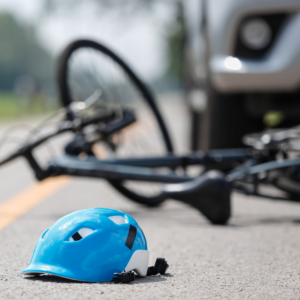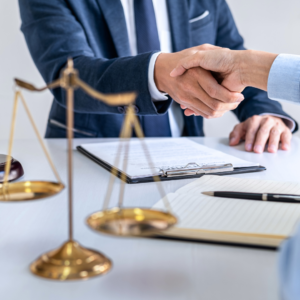Bicycle accidents can be devastating. Whether it’s a car running a red light or an unexpected door opening in your path, the result is often the same: injuries, medical bills, and lots of questions. One of the biggest questions is, “Who pays for all of this?”
In Washington, DC, dealing with health insurance after a bicycle crash isn’t always straightforward. Knowing what coverage is available and how to access it can make all the difference in your recovery process. Talk to the knowledgeable bicycle accident attorneys at Regan Zambri Long for a free case review.
Contact Us Today to Schedule
a Free Consultation
Getting hurt in a bicycle accident is stressful enough without having to worry about how you’ll pay for your medical attention. Thankfully, different types of insurance can help cover the costs, whether it’s your health insurance, your auto insurance, or the at-fault driver’s insurance. Here’s a breakdown of what to expect and how each type of coverage can play a role:

It’s also important to understand that health insurance companies may try to recover costs from any settlement or judgment you receive from the at-fault driver. In other words, if someone else is responsible for your injuries, your health insurance company may seek reimbursement for the money they spent on your medical care from the at-fault party’s insurance.
Even if you were riding a bike and not driving a car, auto insurance may still come into play in your bike accident claim. Many bicycle accident victims don’t realize their auto insurance policies can cover them in bicycle accidents. There are several types of auto insurance coverage that might help pay for your medical bills.
Personal injury protection (PIP) coverage is a part of many auto insurance policies and can help pay for medical expenses, regardless of who was at fault in the accident. In Washington DC, PIP can cover not only your medical costs but also lost wages and other expenses related to your injury. If you own a motor vehicle and have PIP coverage, it might extend to you, even if you were on your bike when the accident happened.
But keep in mind, PIP coverage often has limits, meaning it may only pay up to a certain amount. If your medical bills are high, PIP might not cover everything.
If the driver who hit you doesn’t have insurance or doesn’t have enough to cover your injuries, uninsured motorist (UM) coverage can step in. This type of coverage is designed to protect you when the at-fault driver is underinsured or uninsured altogether.
If your auto insurance policy includes UM coverage, you could potentially file a personal injury claim with your own insurer to help pay for your injuries, even though you were riding a bicycle at the time of the accident.
If the driver who hit you is the at-fault negligent party, their auto insurance policy should cover your medical expenses under their liability coverage. This is typically the first place people look to recover costs after a bike accident. However, getting the at-fault driver’s insurance to pay isn’t always a smooth process. Insurance companies often try to minimize payouts, meaning you may need to fight to get what you’re owed.
After a bicycling accident, figuring out which insurance policy should cover your injuries can be confusing. Whether it’s your health insurance, the driver’s car insurance, or even your own auto policy, several types of coverage may come into play.

If a bicyclist was hit by a car, the at-fault negligent driver’s insurance should be the first line of defense. However, if the driver doesn’t have enough coverage or the cyclist has their own PIP or UM coverage through their auto insurance, those policies may help cover additional costs. Health insurance is another option, but as mentioned before, it might not cover everything, and their insurer could seek reimbursement from any settlement.
If no car was involved—say, you were injured due to poor road conditions or a defective bike part—then your health insurance may be your primary means of paying for medical care unless you pursue a personal injury lawsuit.
Having your insurance claim denied can be frustrating and stressful. But it doesn’t mean you’re out of options. If your health, auto, or the at-fault driver’s insurance denies your claim, you have the right to appeal. Insurance companies sometimes deny claims because they say you’re not covered, there’s not enough evidence, or they dispute the severity of your injuries.
It’s important to carefully review your policy and the reason for the denial. Sometimes, claims are denied due to simple paperwork errors or missed deadlines. In other cases, the insurance company may need more documentation from your doctor or proof of the accident. Working with a bike accident law firm can greatly improve your chances of getting the denial reversed.
If insurance isn’t enough to cover your medical bills and other losses, or if the insurance company is being difficult, you might consider filing a lawsuit. A personal injury lawsuit can help you recover financial compensation for:
It’s important to know that Washington, DC follows a contributory negligence rule. This means if you are found even partially at fault for the accident—say, you ran a red light—you could be barred from recovering damages. That’s why having experienced personal injury lawyers on your side is important when pursuing a bicycle accident lawsuit.

A lawyer can also handle the back-and-forth with health insurance companies, making sure they don’t unfairly reduce your settlement or claim you weren’t entitled to certain benefits. Additionally, if your insurance claim is denied, an attorney can help with appeals and advocate on your behalf to ensure you get the maximum compensation you deserve.
After a bicycle accident, the maze of health insurance and other coverage options can feel overwhelming, especially when you’re trying to recover from serious injuries. At Regan Zambri Long, our experienced Washington DC Injury Lawyers are here to help you understand your options, deal with insurance companies, and get the compensation you deserve.
If you or a loved one has been injured in a bicycle accident in Washington, DC, don’t wait to get legal advice. Contact Regan Zambri Long’s bicycle accident attorneys today for a free consultation. With our decades of experience and extensive record of success, let us handle the legal work so you can focus on healing and getting back on your bike.